高教版职高英语2(基础模块)Unit6PPT课件
- 格式:ppt
- 大小:11.01 MB
- 文档页数:68

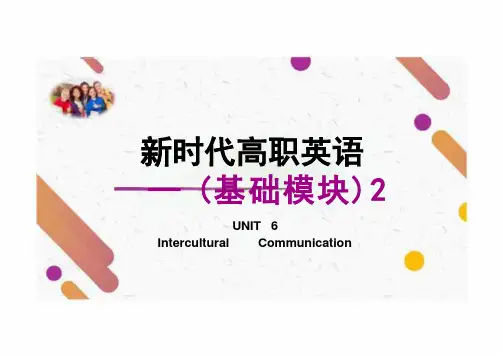
新时代高职英语—(基础模块)2UNIT6Intercultural Communication2 35 目录ContentsI Look and match.bowing鞠躬 shaking hands 握手I Look and match. pressing palms together under chin and say"Namaste"双手合十放在胸前说“你好(印度斯坦语)"rubbing noses碰鼻礼1 )greet Lisa from India2)greet John from Japan 5 ) greet Lily from GermanyI Look and match.hugging 拥抱(4 )greet jack from France(3 )greet Mona from America( 6 )greet Nina from New Zealandkissing亲吻ⅡWatch the video and fill in the blanks.ⅡWatch the video and fill in the blanks.How do we gain international awareness?1.Be open to new encounters and c urious for new experiences.2. Don't be afraid.3. Be vigilant and observe.so you won't make a faux pas.4. Respect foreign customs, rituals, and culture.5.Bepatient. And in case somebody does not behave how you expect, don't take it personally.6.Be kind-hearted.7. S hare your own customs and culture with others.8.Share your intercultural experience w i th colleagues and friends.I Listen to the dialogue and choose the right answer. Dialogue 11. Why does Matthew feel a bit offended when he greets a client from Japan?A. Because the client from Japan doesn't bow back.B. Because the client from Japan smiles at him all the time.C. Because the client from Japan shakes his hand firmly.D. Bccause the client's handshake is so limp.A 2.Which country are the speakers in?A.America.B.Japan.C. China.D. Brazil.3. According to this conversation, which of the following statements is NOT true?A.Japanese businessmen typically bow to greet each other.B. Firm handshakes in America signify confidence and respect.C.In Japan, making eye contact with others could be considered rude.D.In America, knowing a lot about other cultures can offend some people.IV Make a similar dialogue and act it out with your partner in the class.1.imp re ss2.pale3. re luc tan t4. we i rd5. ca tch a co ld6. con fu sed7.unso l ic i t ed8.sympa thy9.be rega rded as ★e.g. He wa s imp r essed by the h igh calibre o f app l i cants fo r the job.★e.g. Veins showed through her pale skin .她苍白的皮肤下一条条血管清晰可见。
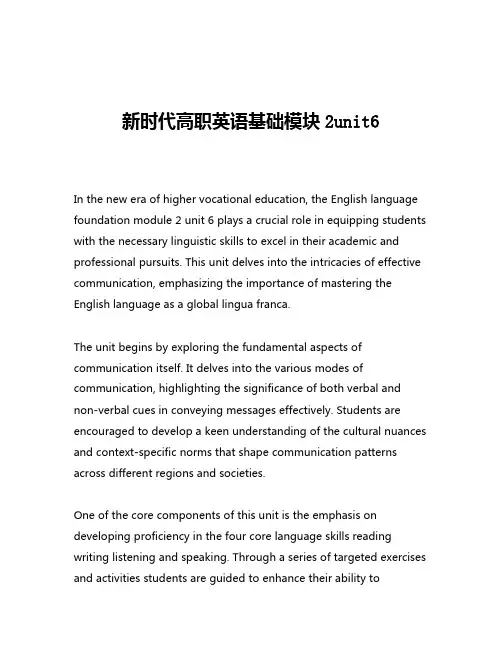
新时代高职英语基础模块2unit6In the new era of higher vocational education, the English language foundation module 2 unit 6 plays a crucial role in equipping students with the necessary linguistic skills to excel in their academic and professional pursuits. This unit delves into the intricacies of effective communication, emphasizing the importance of mastering the English language as a global lingua franca.The unit begins by exploring the fundamental aspects of communication itself. It delves into the various modes of communication, highlighting the significance of both verbal and non-verbal cues in conveying messages effectively. Students are encouraged to develop a keen understanding of the cultural nuances and context-specific norms that shape communication patterns across different regions and societies.One of the core components of this unit is the emphasis on developing proficiency in the four core language skills reading writing listening and speaking. Through a series of targeted exercises and activities students are guided to enhance their ability tocomprehend written texts interpret spoken discourse compose coherent written pieces and engage in meaningful dialogues.In the realm of reading students are exposed to a diverse range of materials ranging from academic articles to business reports and literary works. They are trained to employ effective strategies such as skimming scanning and close reading to extract key information and grasp the underlying themes and messages. This not only strengthens their comprehension skills but also broadens their intellectual horizons by introducing them to a wealth of knowledge across various disciplines.The writing component of the unit focuses on equipping students with the necessary skills to produce well-structured and coherent written pieces. From crafting persuasive essays to composing professional emails and reports students are guided through the writing process step-by-step. Particular emphasis is placed on developing a strong command of grammar vocabulary and organizational structures to ensure their written communication is both effective and polished.Listening skills are honed through the analysis of authentic audio and video materials covering a wide spectrum of topics. Students learn to distinguish between main ideas and supporting details identify speakers attitudes and intentions and recognize linguisticnuances such as tone and register. This training not only enhances their ability to comprehend spoken English but also prepares them to navigate real-world communicative scenarios with confidence.The speaking component of the unit is perhaps the most dynamic and interactive aspect as it allows students to put their linguistic knowledge into practice. Through role-playing discussions presentations and debates students develop the confidence and fluency to express their ideas clearly and persuasively. Particular attention is paid to developing strategies for effective turn-taking managing conversations and adapting one's language to suit different communicative contexts.Throughout the unit students are also introduced to the cultural dimensions of language use. They explore how cultural differences can influence communication styles and patterns and learn strategies for navigating cross-cultural interactions with sensitivity and respect. This exposure not only broadens their cultural awareness but also equips them with the tools to communicate effectively in diverse global settings.In addition to the core language skills the unit also emphasizes the development of critical thinking and problem-solving abilities. Students are challenged to analyze complex scenarios evaluate different perspectives and formulate well-reasoned responses. Thisnot only strengthens their intellectual capacities but also enhances their ability to engage in substantive discussions and make informed decisions.The assessment framework of this unit is designed to provide a comprehensive evaluation of students progress. It encompasses a range of assessment methods including written exams oral presentations group projects and individual assignments. This multifaceted approach ensures that students are evaluated holistically on their linguistic abilities as well as their broader cognitive and communicative competencies.Beyond the confines of the classroom the skills and knowledge acquired in this unit have far-reaching implications for students personal and professional development. Proficiency in English opens doors to a world of opportunities whether it is pursuing higher education abroad securing employment in multinational corporations or engaging in international business ventures. The ability to communicate effectively in English is increasingly becoming a prerequisite for success in the globalized world.In conclusion the English language foundation module 2 unit 6 is a pivotal component of the new era of higher vocational education. By equipping students with a comprehensive set of linguistic skills and cultural awareness it prepares them to navigate the complexities ofthe modern world with confidence. As the global demand for effective communicators continues to rise this unit serves as a vital springboard for students to realize their full potential and thrive in their academic and professional endeavors.。


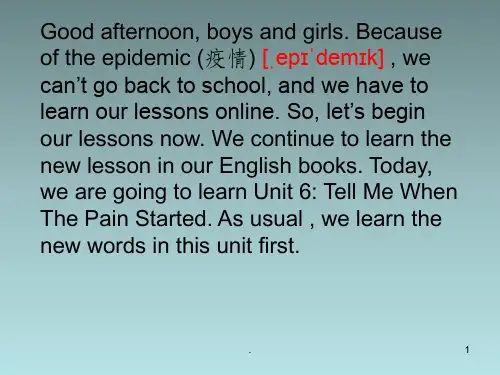



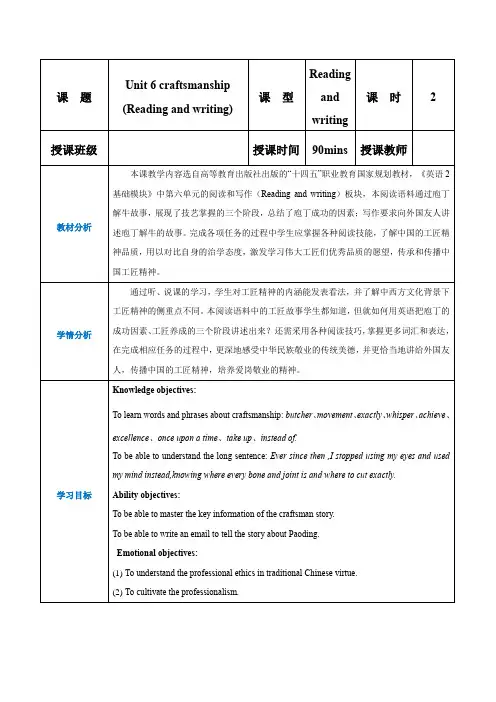
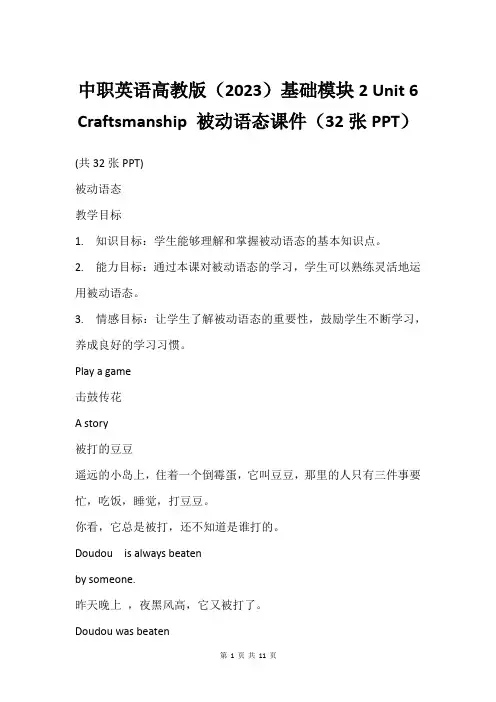
中职英语高教版(2023)基础模块2 Unit 6 Craftsmanship 被动语态课件(32张PPT)(共32张PPT)被动语态教学目标1. 知识目标:学生能够理解和掌握被动语态的基本知识点。
2. 能力目标:通过本课对被动语态的学习,学生可以熟练灵活地运用被动语态。
3. 情感目标:让学生了解被动语态的重要性,鼓励学生不断学习,养成良好的学习习惯。
Play a game击鼓传花A story被打的豆豆遥远的小岛上,住着一个倒霉蛋,它叫豆豆,那里的人只有三件事要忙,吃饭,睡觉,打豆豆。
你看,它总是被打,还不知道是谁打的。
Doudou is always beatenby someone.昨天晚上,夜黑风高,它又被打了。
Doudou was beatenyesterday evening.明天,豆豆还会面临n顿暴打,可怜的豆豆啊。
Tomorrow ,Doudou will be beaten several times .可怜的豆豆,已经被这样打了很多年。
命运一直没有改变。
Poor Doudou has been beaten for many years.我们亲爱的豆豆现在在干嘛,不用问,一定是正在被打。
Our dear doudou is being beaten now .随时可能被打的豆豆啊,谁来救救它啊。
Poor Doudou may be beaten anytime .被动语态The Passive Voice英语动词有两种语态:主动语态(the Active Voice)被动语态(the Passive Voice)A. 主动语态表示主语是动作的执行者。
B. 被动语态表示主语是动作的承受者。
We plant the tree.The tree is planted by us.注:后面能接宾语的动词才有被动语态We speak English.主语谓语宾语English is spoken by us.主语谓语宾语主动语态被动语态They clean the classroom .他们打扫教室。